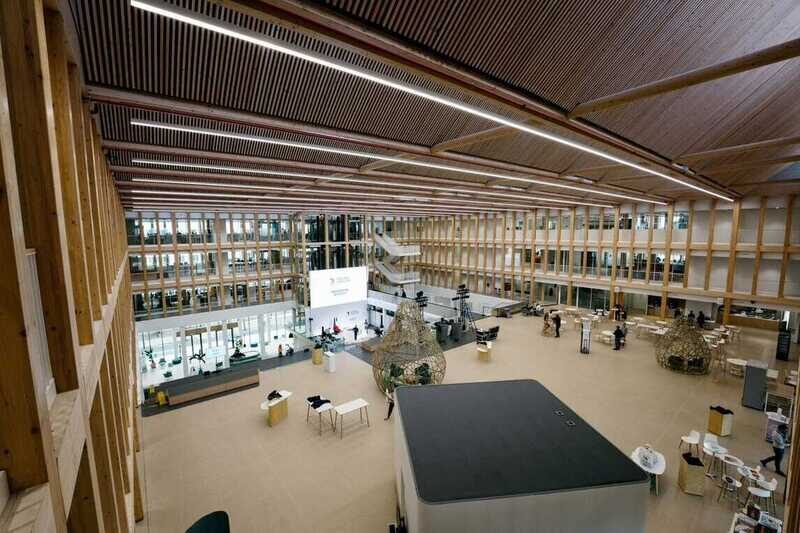Danone inaugurates new space to develop the products of the future

he building is designed on five levels (R+4) around a very large central atrium, called the Plaza.
Danone has opened its new Research and Innovation Center on the Paris-Saclay campus centred on a mission to bring health through food to as many people as possible,
In inaugurating the centre, Antoine de Saint-Affrique, chief executive officer of Danone, in the presence of the French Prime Minister Elisabeth Borne, said Danone is dedicating a new space to develop the products of the future within its ecosystem.
At the inauguration, Danone unveiled a new product, which is an exclusive development for the Paris 2024 Olympic and Paralympic Games: HiPRO Expert, an original recipe developed with the site’s researchers, in collaboration with athletes.
The recipe is made especially for athletes. Rich in proteins, source of vitamins and minerals, with the same
texture and intensity of taste familiar to consumers.
The research center will be dedicated to the development and innovation of Danone’s “fresh dairy and plant-based products” and “natural mineral water” categories. It will include laboratories at the forefront of research and pilot production sites for innovation and limited production of specific prototypes.
The site currently employs more than 550 people, including world-class researchers in life sciences, fermentation and intestinal microbiota, nutrition, and health, as well as experts in consumer experience and social sciences, and specialists in product design, packaging, and pilot-scale production.
With this innovation, Danone reaffirms its commitment to support Paris 2024 in its ambition to offer dairy and plant-based products adapted to athletes and to promote better nutritional and sporting practices.
Danone is committed to a healthier society through a successful duo: food and sports.
Antoine de Saint-Affrique, said: “Driven by this pioneering spirit, our ‘Renew Danone’ strategic plan puts science and technology back at the center of innovation, making them key growth drivers for the company. Better serving increasingly diverse consumers and patients, and doing so in a more sustainable and innovative way, is a conundrum where we need science and research more than ever to find solutions.”
Isabelle Esser, executive vice president, research, innovation, quality and food safety at Danone added: “Enabling consumers to make appropriate food choices while innovating to meet the needs associated with physical and mental well-being is our priority. This is achieved mainly through our diversified portfolio of products, which address various nutritional needs without compromising taste or quality.
“Our ambition for this site is to continue to honour our mission while staying one step ahead of the trends that will shape the food of tomorrow.”
The new Daniel Carasso International Research & Innovation Center, in line with Danone’s One Planet, One Health vision, this B Corp-labeled facility has also been designed to limit its impact on the environment. It features wooden frames, photovoltaic panels, geothermal heating and cooling, and a water recovery system. These multiple initiatives make the building the first-ever European research center to hold the low carbon label.
The building is designed on five levels (R+4) around a very large central atrium, called the Plaza: 900 m² with a ceiling height of nearly 10 m, designed as a village square to promote the gathering of Danoners and encourage meetings around various events.
The first floor offers a large transparent view of the interior of the building and its activities, as desired by the EPA Paris-Saclay. It houses the reception hall and its terraces, allowing natural light to flow through. It also has the Danone Café, which is open to all, and a 500 m² consumer area for “tests” with volunteer consumers.
While the second floor houses the project spaces and the food creation laboratories (Food Lab), with a view of the 3500 m² of “pilot” spaces, the last three floors house offices, evolving coworking spaces, meeting rooms, and prototyping and research laboratories in the fields of chemistry, physical chemistry, molecular biology, and spectroscopic analysis.
The Daniel Carasso International Research & Innovation Center in Paris-Saclay will focus its research on five main areas:
- Consumers and patients: to continue to provide innovative solutions that meet needs and uses throughout life
- A product portfolio focused on health and taste: to promote a varied, tasty, high-quality diet for all ages
- Science and technology: working with academia, partners, and start-ups to advance research on nutrition, hydration, immunity, microbiota, fermentation and animal and plant proteins
- Tomorrow’s packaging: to develop suitable packaging that guarantees food safety and meets the major environmental challenges of our industry
- Digital and data: to collect more data and analyse it more efficiently to develop numerical services such as apps, and constantly improve traceability from the design of a product to its manufacture and remain at the cutting edge of technology



